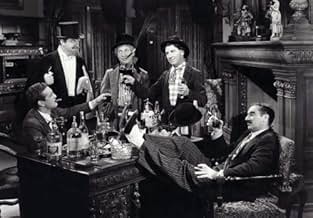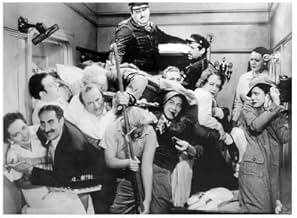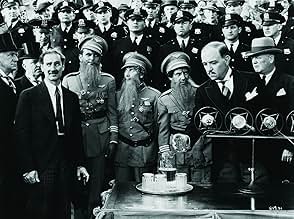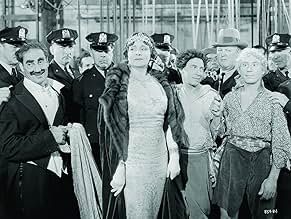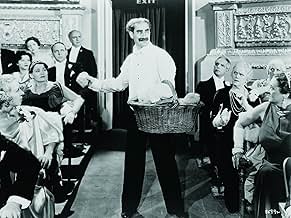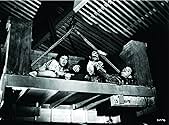CALIFICACIÓN DE IMDb
7.8/10
36 k
TU CALIFICACIÓN
Un astuto gerente de negocios y los amigos de dos cantantes de ópera les ayudan a alcanzar el éxito mientras humillan a sus enemigos.Un astuto gerente de negocios y los amigos de dos cantantes de ópera les ayudan a alcanzar el éxito mientras humillan a sus enemigos.Un astuto gerente de negocios y los amigos de dos cantantes de ópera les ayudan a alcanzar el éxito mientras humillan a sus enemigos.
- Dirección
- Guionistas
- Elenco
- Premios
- 3 premios ganados en total
Walter Woolf King
- Rudolfo Lassparri
- (as Walter King)
Sig Ruman
- Herman Gottlieb
- (as Siegfried Rumann)
Robert Emmett O'Connor
- Police Sergeant Henderson
- (as Robert Emmet O'Connor)
Enrique Acosta
- Nightclub Guest
- (sin créditos)
Harry Adams
- Opera Spectator
- (sin créditos)
Harry Allen
- Doorman
- (sin créditos)
Sam Appel
- Dungeon Guard
- (sin créditos)
King Baggot
- Dignitary
- (sin créditos)
Marion Bell
- Lady looking for 'Aunt Minnie'
- (sin créditos)
Edna Bennett
- Maid
- (sin créditos)
Dolly Blackburn
- Little Girl watching Harpo playing
- (sin créditos)
Resumen
Reviewers say 'A Night at the Opera' is celebrated for its iconic comedic routines and the Marx Brothers' unique blend of verbal and physical comedy. Groucho's wit, Chico's musical talents, and Harpo's slapstick humor are highlighted. Margaret Dumont's role and musical numbers add entertainment value, though some criticize their integration. The film is praised for its production quality and subversion of high society norms. However, a perceived shift towards more structured comedy marks the beginning of a decline in their later works.
Opiniones destacadas
Amusing and entertaining Marx picture , it has a lot of funny material and unfortunately intrusive songs . Groucho's wisecracks and the incomparable Chico and Harpo carry the movie . It deals with a sly business manager named Otis B. Driftwood (Groucho Marx) and two (Chico Marx as Fiorello and Harpo Marx as Tomasso) wacky friends of two (Kitty Carlisle as Rosa and Allan Jones as Ricardo) opera singers help them achieve success while humiliating their stuffy and snobbish enemies . Later on , Marx Brothers anarchize the opera , insulting and mocking the guests and players . Their actions include some on stage antics during the stage debut , as they arrange for the normal tenor to be absent so that the young lover named Ricardo can get his chance .
Classic Marx film with many funny sequences , this is the most sustained bit of insanity , full of crazy gags , antics and amusement , being now deemed a satiric masterpiece ,and one of the biggest hits . Although it suffers from staginess and musical comedy plotting but gives the zany threesome plenty of comic elaboration . Enough gags for give several movies , but our favorite is still the cabin scene . Despite the abundant songs and silly as well as sappy love story the movie maintains itself very well . This is a fun comedy as hilariously amusing as the films they made at Paramount with Zeppo . This is a M.G.M production lavishly financed by Irving Thalberg . Excellent Harpo Marx , as usual , he even did many of his own stunts , he later said it was a silly thing for a 47-year-old non-stuntman to have done . Groucho said that this was his favorite among his movies . The Marx Bros (minus Zeppo) are in peak form in this vintage musical comedy with co-star the legendary Margaret Dumont , including sparkling dialogs with Groucho . Furthermore , Sig Ruman makes his first of three appearances in The Marx Brothers films. However , this is the first Marx Brothers film made without brother Zeppo Marx, it started a new trend of The Marx Brothers movies featuring a Zeppo-like supporting character who carries the love story and sings the song . The motion picture was well directed by Sam Wood . Sam Wood, freshman The Marx Brothers director in this film, was a perfectionist , the scene in which Harpo Marx hangs from the rope was filmed so many times that Harpo Marx's hands became cut and swollen from the rope . Don't miss it , one of the funniest picture ever made by Marx Brothers
Other important films starred by Marx Brothers -many of them Broadway farce plays transfered by scenarists into vehicle for the Brothres- , they are the followings : ¨Animal crackers¨, ¨Duck soap¨ that was a flop when first released but today considered a masterpiece , ¨Horse Feathers¨, ¨At the circus¨, ¨Day at the races¨ , ¨Room service¨ , ¨Go West¨, ¨Love Happy¨ and ¨Night in Casablanca¨, though in 1946 the Marx formula was wearing thin . Any film with Groucho , Chico , Harpo and Zeppo is well worth seeing .
Classic Marx film with many funny sequences , this is the most sustained bit of insanity , full of crazy gags , antics and amusement , being now deemed a satiric masterpiece ,and one of the biggest hits . Although it suffers from staginess and musical comedy plotting but gives the zany threesome plenty of comic elaboration . Enough gags for give several movies , but our favorite is still the cabin scene . Despite the abundant songs and silly as well as sappy love story the movie maintains itself very well . This is a fun comedy as hilariously amusing as the films they made at Paramount with Zeppo . This is a M.G.M production lavishly financed by Irving Thalberg . Excellent Harpo Marx , as usual , he even did many of his own stunts , he later said it was a silly thing for a 47-year-old non-stuntman to have done . Groucho said that this was his favorite among his movies . The Marx Bros (minus Zeppo) are in peak form in this vintage musical comedy with co-star the legendary Margaret Dumont , including sparkling dialogs with Groucho . Furthermore , Sig Ruman makes his first of three appearances in The Marx Brothers films. However , this is the first Marx Brothers film made without brother Zeppo Marx, it started a new trend of The Marx Brothers movies featuring a Zeppo-like supporting character who carries the love story and sings the song . The motion picture was well directed by Sam Wood . Sam Wood, freshman The Marx Brothers director in this film, was a perfectionist , the scene in which Harpo Marx hangs from the rope was filmed so many times that Harpo Marx's hands became cut and swollen from the rope . Don't miss it , one of the funniest picture ever made by Marx Brothers
Other important films starred by Marx Brothers -many of them Broadway farce plays transfered by scenarists into vehicle for the Brothres- , they are the followings : ¨Animal crackers¨, ¨Duck soap¨ that was a flop when first released but today considered a masterpiece , ¨Horse Feathers¨, ¨At the circus¨, ¨Day at the races¨ , ¨Room service¨ , ¨Go West¨, ¨Love Happy¨ and ¨Night in Casablanca¨, though in 1946 the Marx formula was wearing thin . Any film with Groucho , Chico , Harpo and Zeppo is well worth seeing .
"A Night at the Opera" is great Marx Brothers entertainment. It has comedy, music, and a good cast - everything except Zeppo, who by this time had left the act. It fully deserves its reputation as one of the two best Marx Brothers films, along with "Duck Soup".
"A Night at the Opera" is probably slightly less funny than "Duck Soup" (it is no criticism to say that of any film), but it has more of a story to connect the great comic bits. There is a good supporting cast in both films - here Sig Ruman is especially funny, in addition to the perennial Margaret Dumont. It also has several fairly long musical interludes - some are operatic, but the most entertaining is Chico and Harpo's impromptu shipboard entertainment.
Of course, the real attraction in any of these films is the comedy, and there are some memorable bits in this one. The contract negotiations between Chico and Groucho, and the scene in Groucho's stateroom, are especially hilarious, and you have to see the stateroom scene more than once to catch everything. And for sustained zany humor, the climactic sequence at the opera might be the funniest part of all.
This is certainly a must for Marx Brothers fans.
"A Night at the Opera" is probably slightly less funny than "Duck Soup" (it is no criticism to say that of any film), but it has more of a story to connect the great comic bits. There is a good supporting cast in both films - here Sig Ruman is especially funny, in addition to the perennial Margaret Dumont. It also has several fairly long musical interludes - some are operatic, but the most entertaining is Chico and Harpo's impromptu shipboard entertainment.
Of course, the real attraction in any of these films is the comedy, and there are some memorable bits in this one. The contract negotiations between Chico and Groucho, and the scene in Groucho's stateroom, are especially hilarious, and you have to see the stateroom scene more than once to catch everything. And for sustained zany humor, the climactic sequence at the opera might be the funniest part of all.
This is certainly a must for Marx Brothers fans.
No doubt that "A Night at the Opera" is right up there with "Duck Soup" as the best Marx Brothers movie. Some Marx-purists complain "ANatO" is when the brothers started to grow soft and their quality started to decline. For one thing, instead of ridiculing romantic couples (the love story subplot plays a big part), they support them. Also, it's not as surreal or satirical as their past films. To those purists, I say: Lighten up! "ANatO" is just as funny as anything the Marx Bros did in the past (heck, I think it's funnier than "Monkey Business"), and it's withstood the test of time perfectly. In fact, "ANatO" is said to be Groucho's favorite; he even called his previous films "duds"! The film is filled with jabs at the upper class and double entendres courtesy of Groucho. Sample:
Mrs. Claypool: Do you have everything, Otis?
Otis: I haven't had any complaints yet!
The love story subplot isn't as nauseating as 1937's "A Day at the Races". Allan Jones may be a bit too mushy, but Kitty Carlisle, the love interest, is cool and calm enough to help it go down easily (that's really her singing, by the way). Chico and Harpo have some inspired moments, such as their gleeful butchering of "Il Travotore" (sp?). The hapless villains are the funniest Marx foils ever, and the finale is just uproarious. "ANatO" is a wonderfully silly romp, and it's rather harmless, so kids can probably watch and enjoy it. The famous stateroom scene is nothing short of brilliant, and you'll find yourself humming along to "Cosi Cosa" (I just wish the ballad "Alone" had been left, well, alone). Don't miss this hilarious masterpiece. And now, on with the opera!!
Mrs. Claypool: Do you have everything, Otis?
Otis: I haven't had any complaints yet!
The love story subplot isn't as nauseating as 1937's "A Day at the Races". Allan Jones may be a bit too mushy, but Kitty Carlisle, the love interest, is cool and calm enough to help it go down easily (that's really her singing, by the way). Chico and Harpo have some inspired moments, such as their gleeful butchering of "Il Travotore" (sp?). The hapless villains are the funniest Marx foils ever, and the finale is just uproarious. "ANatO" is a wonderfully silly romp, and it's rather harmless, so kids can probably watch and enjoy it. The famous stateroom scene is nothing short of brilliant, and you'll find yourself humming along to "Cosi Cosa" (I just wish the ballad "Alone" had been left, well, alone). Don't miss this hilarious masterpiece. And now, on with the opera!!
I must admit that I am very light in personal knowledge of MArx Brothers films,and aside from the general information,imagery and quotes(the majority of which came from the irrepressible Groucho)that have been used and attributed in Western culture over the last seventy or eighty odd years,I have a very scant referential knowledge of their legendary body of film work.
With that in mind,when I saw the public library had a copy of this film in its stacks,it was a no-brainer for me. And it was a largely pleasing film experience as well.
The storyline seems to be somewhat insignificant: Brothers MArx are scattered about the goings on at a Venetian Opera company as it moves from Europe to New York City. They conspire to break a humble but talented tenor into the main role of the traveling show,as he is mooning over the young ingénue(Kitty Carlisle Hart,WELL before becoming the grand dame of TV Panel game shows!). But aside from the fair amount of music(hey,this IS,after all set in an Opera,so it goes to reason),this is mostly a physical comedy,laced with plenty of Groucho's standard one-liners. From watching his dealings with various straight people,from old stand-by MArgaret Dumont as his society-climbing wife,to the various lugs who signify authority(Theater directors,producers,society bigwigs,ship crew,policemen,local magistrates,etc.),Groucho is not only able to keep the humor legendarily fast and loose but also keeps the tempo of the dialog from bogging(I even noticed a sort of inspiration the creators at WArner Brothers got for Bugs Bunny from Groucho's witticisms!).
Maybe not the best of the Marxes films--though I still don't have a real gauge of opinion on this yet--but it's a fantastic starter film to build familiarity.
With that in mind,when I saw the public library had a copy of this film in its stacks,it was a no-brainer for me. And it was a largely pleasing film experience as well.
The storyline seems to be somewhat insignificant: Brothers MArx are scattered about the goings on at a Venetian Opera company as it moves from Europe to New York City. They conspire to break a humble but talented tenor into the main role of the traveling show,as he is mooning over the young ingénue(Kitty Carlisle Hart,WELL before becoming the grand dame of TV Panel game shows!). But aside from the fair amount of music(hey,this IS,after all set in an Opera,so it goes to reason),this is mostly a physical comedy,laced with plenty of Groucho's standard one-liners. From watching his dealings with various straight people,from old stand-by MArgaret Dumont as his society-climbing wife,to the various lugs who signify authority(Theater directors,producers,society bigwigs,ship crew,policemen,local magistrates,etc.),Groucho is not only able to keep the humor legendarily fast and loose but also keeps the tempo of the dialog from bogging(I even noticed a sort of inspiration the creators at WArner Brothers got for Bugs Bunny from Groucho's witticisms!).
Maybe not the best of the Marxes films--though I still don't have a real gauge of opinion on this yet--but it's a fantastic starter film to build familiarity.
A NIGHT AT THE OPERA (MGM, 1935) directed by Sam Wood, re-introduces the Marx Brothers to the screen following their five years at the Paramount studio (1929-1933) to MGM, this being the start of a new beginning and the end to their wild world of comedy. It also brings forth their most popular comic foil of all, Margaret Dumont, from their Broadway to Paramount days, and the return to a formula story and time out for musical interludes either by the brothers or the romantic lovers originally done in their initial films of THE COCOANUTS (1929) and ANIMAL CRACKERS (1930). Aside from now being The Three Marx Brothers (Zeppo who has since retired), their characters have been toned down a bit, which helps. However, at MGM, with this, their best film for the studio, Groucho and Harpo become victims instead of instigators, with such notable scenes as Harpo employed as a dresser for an abusive opera tenor (Walter Wolfe King) who slaps, hits and uses a whip on him (at one point off camera) whenever getting out of line with his buffoonery, and Groucho, who always wins out in every situation physically and verbally, getting kicked down four flights of stairs, which indicates they are not always indestructible, yet remain in character from the old days whenever possible. Chico retains his wiseacre Italian character, remaining notably the same from his previous efforts, however, things will start to change not for the better for him and his brothers in the movies to follow.
Plot summary: Introduction takes place in Milan, Italy, where Otis B. Driftwood (Groucho) agrees to represent dowager Mrs. Claypool (Margaret Dumont) into society by arranging for her to invest $200,000 to Herman Gottlieb (Sig Ruman), director of the opera company so that he can afford to bring opera singers Rudolpho Lassparri (Walter King) and Rosa Castaldi (Kitty Carlisle) to New York City. Rudolpho loves Rosa, but she is more interested in Ricardo Baroni (Allan Jones), an unknown singer working as a chorus-man, but with the help of Fiorelli (Chico), acting as his manager, and his partner, Tomasso (Harpo), the trio head for America by becoming stowaways on the S.S. Americus, hiding out in Driftwood's tiny stateroom in order for Ricardo to get his big chance as a singer. After Driftwood and his cronies arrive in at the Metropolitan Opera House, thanks to them in disrupting Rudolpho's performance that the art of opera will never be the same again.
The musical program: "Alone" (sung by Kitty Carlisle and Allan Jones) by Nacio Herb Brown and Arthur Freed; "Cosi-Cosa" (sung by Allan Jones) by Bronislau Kaper, Walter Jurmann and Ned Washington; "All I Do is Dream of You" (by Brown and Freed/piano solo by Chico Marx); "Alone" (harp solo by Harpo Marx); and selections from Il Trovatore by Guiseppi Verdi: "Di quella pira," "Miserere," "Anvil Chorus," "Stride la Vampa" "Strido lassu" and "Miserere." Allan Jones and Kitty Carlisle doing their duet, "Alone," him on the pear and she from the boat dock, Chico's fast finger piano playing, and Harpo's harp solo in a serious manner as he performs to a little old lady (facial shadow front only) who looks on approvingly, may not be highlights, but are truly memorable moments.
Highlights: Whenever anyone goes into discussion regarding A NIGHT AT THE OPERA, the first thing that comes immediately to mind is that famous state room scene involving Groucho, Chico and the sleeping Harpo, with various others involved, crammed together until the door opens, having them all falling out like dominoes. This hilarious bit is one that's remembered best with fondness and admiration. However, there are others worth noting: The opening where Dumont awaits for Groucho at a restaurant for an hour only to find him at the table behind her eating with another lady, is priceless; Groucho and Chico contract exchanges that becomes a "sanity clause"; arrested stowaway Harpo's attempt in escaping his detention cabin by crawling out of a porthole and hanging onto a rope outside only to be dumped into the ocean; Jones, Chico and Harpo in bearded disguises posing as celebrity aviators to give speeches on coast-to-coast radio, with the silent Harpo covering up his muteness by constantly drinking glasses of water; the disappearance of beds in Groucho's hotel room while the plainclothesman detective (Robert Emmett O'Connor) investigates; and of course, the climactic opera chaos by the Marxes, with one great bit with the orchestra playing the overture to "Take Me Out to the Ball Game" after coming to the page with the planted song sheets, with Groucho acting as a vendor yelling "Peanuts! Peanuts!" to the patrons. A classic with Callas.
The supporting players: Newcomer Allan Jones steps in for the role that might have been offered to Zeppo. He is a likable actor with a fine singing voice who performs well opposite Kitty Carlisle (another recruit from Paramount and rare screen appearance, being best known as the TV panelist in the long running quiz show, "To Tell the Truth").
Footnote: It is quite evident that prints that have been circulating since commercial television days isn't complete. Missing footage is quite evident during the opening minutes of the story where the movie originally began with a musical number prior to the restaurant scene involving Groucho and Dumont. At present, this, along with other cut footage, no longer exists. Timed at 96minutes, the 90 minute version is the one available on Turner Classic Movies, VHS and DVD formats. Maybe one of these years a completely restored print of A NIGHT AT THE OPERA will suffice, but for now, this will have to do.
In closing: Get out those opera glasses and have yourself a grand night at the opera. (***1/2)
Plot summary: Introduction takes place in Milan, Italy, where Otis B. Driftwood (Groucho) agrees to represent dowager Mrs. Claypool (Margaret Dumont) into society by arranging for her to invest $200,000 to Herman Gottlieb (Sig Ruman), director of the opera company so that he can afford to bring opera singers Rudolpho Lassparri (Walter King) and Rosa Castaldi (Kitty Carlisle) to New York City. Rudolpho loves Rosa, but she is more interested in Ricardo Baroni (Allan Jones), an unknown singer working as a chorus-man, but with the help of Fiorelli (Chico), acting as his manager, and his partner, Tomasso (Harpo), the trio head for America by becoming stowaways on the S.S. Americus, hiding out in Driftwood's tiny stateroom in order for Ricardo to get his big chance as a singer. After Driftwood and his cronies arrive in at the Metropolitan Opera House, thanks to them in disrupting Rudolpho's performance that the art of opera will never be the same again.
The musical program: "Alone" (sung by Kitty Carlisle and Allan Jones) by Nacio Herb Brown and Arthur Freed; "Cosi-Cosa" (sung by Allan Jones) by Bronislau Kaper, Walter Jurmann and Ned Washington; "All I Do is Dream of You" (by Brown and Freed/piano solo by Chico Marx); "Alone" (harp solo by Harpo Marx); and selections from Il Trovatore by Guiseppi Verdi: "Di quella pira," "Miserere," "Anvil Chorus," "Stride la Vampa" "Strido lassu" and "Miserere." Allan Jones and Kitty Carlisle doing their duet, "Alone," him on the pear and she from the boat dock, Chico's fast finger piano playing, and Harpo's harp solo in a serious manner as he performs to a little old lady (facial shadow front only) who looks on approvingly, may not be highlights, but are truly memorable moments.
Highlights: Whenever anyone goes into discussion regarding A NIGHT AT THE OPERA, the first thing that comes immediately to mind is that famous state room scene involving Groucho, Chico and the sleeping Harpo, with various others involved, crammed together until the door opens, having them all falling out like dominoes. This hilarious bit is one that's remembered best with fondness and admiration. However, there are others worth noting: The opening where Dumont awaits for Groucho at a restaurant for an hour only to find him at the table behind her eating with another lady, is priceless; Groucho and Chico contract exchanges that becomes a "sanity clause"; arrested stowaway Harpo's attempt in escaping his detention cabin by crawling out of a porthole and hanging onto a rope outside only to be dumped into the ocean; Jones, Chico and Harpo in bearded disguises posing as celebrity aviators to give speeches on coast-to-coast radio, with the silent Harpo covering up his muteness by constantly drinking glasses of water; the disappearance of beds in Groucho's hotel room while the plainclothesman detective (Robert Emmett O'Connor) investigates; and of course, the climactic opera chaos by the Marxes, with one great bit with the orchestra playing the overture to "Take Me Out to the Ball Game" after coming to the page with the planted song sheets, with Groucho acting as a vendor yelling "Peanuts! Peanuts!" to the patrons. A classic with Callas.
The supporting players: Newcomer Allan Jones steps in for the role that might have been offered to Zeppo. He is a likable actor with a fine singing voice who performs well opposite Kitty Carlisle (another recruit from Paramount and rare screen appearance, being best known as the TV panelist in the long running quiz show, "To Tell the Truth").
Footnote: It is quite evident that prints that have been circulating since commercial television days isn't complete. Missing footage is quite evident during the opening minutes of the story where the movie originally began with a musical number prior to the restaurant scene involving Groucho and Dumont. At present, this, along with other cut footage, no longer exists. Timed at 96minutes, the 90 minute version is the one available on Turner Classic Movies, VHS and DVD formats. Maybe one of these years a completely restored print of A NIGHT AT THE OPERA will suffice, but for now, this will have to do.
In closing: Get out those opera glasses and have yourself a grand night at the opera. (***1/2)
¿Sabías que…?
- TriviaIn exasperation after several attempts to have Groucho Marx read one of his lines in the manner director Sam Wood had requested, Wood exclaimed, "I guess you just can't make an actor out of clay." Groucho Marx instantly responded, "Nor a director out of Wood."
- ErroresRicardo is clearly standing on the dock as the ship pulls away, yet he turns up on board later as a stowaway.
- Citas
Otis B. Driftwood: It's all right, that's in every contract. That's what they call a sanity clause.
[Fiorello laughs loudly]
Fiorello: You can't fool me! There ain't no Sanity Claus!
- Versiones alternativasAll references to the first portion of the film taking place in Italy were edited from the original negative sometime after the original release. There is speculation that this was done during WWII when Italy was as Axis power, but it also may have been done in the late 1930's to appease Mussolini, who didn't like the way Italians were being portrayed. Either way, the film's first scene begins rather abruptly and is missing a musical number and references to Milan, Italy.
- ConexionesEdited into Apaga y vámonos: Episode #1.5 (2013)
- Bandas sonorasIl Trovatore: Di quella pira
(1853) (uncredited)
Music by Giuseppe Verdi
Libretto by Leone Emanuele Bardare and Salvatore Cammarano
Sung by Walter Woolf King
with The MGM Symphony Orchestra
Selecciones populares
Inicia sesión para calificar y agrega a la lista de videos para obtener recomendaciones personalizadas
- How long is A Night at the Opera?Con tecnología de Alexa
Detalles
Taquilla
- Total a nivel mundial
- USD 8,953
- Tiempo de ejecución1 hora 36 minutos
- Color
- Relación de aspecto
- 1.37 : 1
Contribuir a esta página
Sugiere una edición o agrega el contenido que falta



